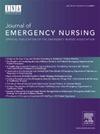Recognizing Clues Associated With Angioedema of the Small Intestine: A Case Report
IF 2.3
4区 医学
Q2 EMERGENCY MEDICINE
引用次数: 0
Abstract
Angiotensin-converting enzyme inhibitors are commonly prescribed for managing cardiovascular conditions, but they can cause adverse reactions, such as dry persistent cough, hyperkalemia, and the serious side effect of angioedema affecting the face, mouth, and tongue. In some cases, angiotensin-converting enzyme inhibitors may also cause angioedema of the small intestine. A case report highlights the diagnostic journey of a 39-year-old female who presented with several months of afebrile, nonspecific gastrointestinal symptoms, including severe abdominal pain, bloating, nausea, and diarrhea. Despite multiple visits to the emergency department and extensive testing, including abdominal computed tomography scans, the underlying cause of her symptoms was not immediately identified.
The case report underscores the challenges health care providers face in diagnosing visceral angioedema and the crucial role of emergency nurses in recognizing key warning signs such as nonspecific abdominal complaints in patients on angiotensin-converting enzyme inhibitor therapy. Early identification of this condition can prevent unnecessary procedures, prevent prolonged symptoms, and improve patient outcomes. This case emphasizes the need for increased awareness about angiotensin-converting enzyme inhibitor–induced angioedema of the small intestine. Health care providers should consider it in the differential diagnosis, particularly in patients prescribed angiotensin-converting enzyme inhibitors presenting with abdominal symptoms.
识别与小肠血管性水肿相关的线索:1例报告。
血管紧张素转换酶抑制剂通常用于治疗心血管疾病,但它们可能引起不良反应,如干咳、高钾血症,以及影响面部、口腔和舌头的血管性水肿的严重副作用。在某些情况下,血管紧张素转换酶抑制剂也可能引起小肠血管性水肿。一个病例报告强调了一名39岁女性的诊断过程,她表现出几个月的发热、非特异性胃肠道症状,包括严重腹痛、腹胀、恶心和腹泻。尽管多次前往急诊科并进行了广泛的检查,包括腹部计算机断层扫描,但她症状的根本原因并未立即确定。该病例报告强调了卫生保健提供者在诊断内脏血管性水肿方面面临的挑战,以及急诊护士在识别关键警告信号(如接受血管紧张素转换酶抑制剂治疗的患者的非特异性腹部不适)方面的关键作用。早期识别这种情况可以防止不必要的手术,防止症状延长,并改善患者的预后。本病例强调需要提高对血管紧张素转换酶抑制剂引起的小肠血管性水肿的认识。卫生保健提供者在鉴别诊断时应考虑到这一点,特别是在服用血管紧张素转换酶抑制剂并出现腹部症状的患者中。
本文章由计算机程序翻译,如有差异,请以英文原文为准。
求助全文
约1分钟内获得全文
求助全文
来源期刊
CiteScore
3.10
自引率
11.80%
发文量
132
审稿时长
46 days
期刊介绍:
The Journal of Emergency Nursing, the official journal of the Emergency Nurses Association (ENA), is committed to the dissemination of high quality, peer-reviewed manuscripts relevant to all areas of emergency nursing practice across the lifespan. Journal content includes clinical topics, integrative or systematic literature reviews, research, and practice improvement initiatives that provide emergency nurses globally with implications for translation of new knowledge into practice.
The Journal also includes focused sections such as case studies, pharmacology/toxicology, injury prevention, trauma, triage, quality and safety, pediatrics and geriatrics.
The Journal aims to mirror the goal of ENA to promote: community, governance and leadership, knowledge, quality and safety, and advocacy.

 求助内容:
求助内容: 应助结果提醒方式:
应助结果提醒方式:


